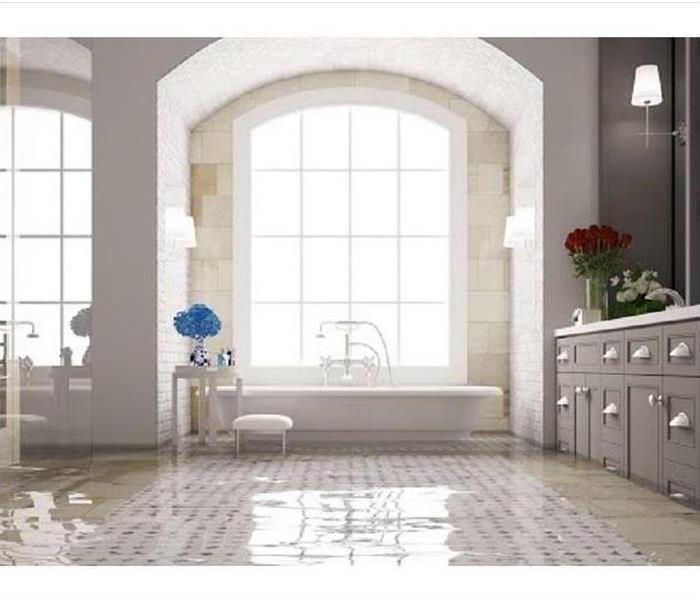What to Expect During Water Damage Restoration | SERVPRO of Eaton County, Clinton and Gratiot Counties, Lansing & Holt
1/7/2021 (Permalink)
 A water disaster can create issues that you may not be aware of. If you experience water damage of any kind, give SERVPRO ECGLH a call (517)541-1170
A water disaster can create issues that you may not be aware of. If you experience water damage of any kind, give SERVPRO ECGLH a call (517)541-1170
What to Expect During Water Damage Restoration
Whether you have a leak in the basement, water in the attic, or a burst pipe in your wall, water can lead to one of the more stressful types of damages you will have to deal with as a homeowner. You can alleviate some of the stress by knowing what to expect during the water damage repair process so you can prepare accordingly.
Address the Cause
It does little good to repair damages if they will simply occur again. Generally, a broken pipe or leaking foundation will lead to water in the basement, whereas water in the attic is generally from roof damage or poor ventilation. Water elsewhere in the home is most likely from a plumbing leak. HVAC systems can also develop condensation along the ducts, which can lead to water damage in the ceiling.
Once you know the cause, you can contact a plumber, roofer, or another suitable contractor to fix the leak and stop the flow of water.
Pro Tip:
If you can't find the leak and you aren't sure who to call, contact a water damage restoration company. They may offer leak detection services or be able to refer you to one of these professionals.
Assess the Damage
Water damage can go much further than just what you see. Even after the surface moisture dries, wet conditions can persist out of sight. Mold may also have taken hold in hidden areas. Stains, warped materials, and damage to carpets and furniture can also be present. The restoration technician has a variety of tools at their disposal to accurately assess the extent of the damage.
Pro Tip:
Don't attempt to do any sort of assessment or cleanup on your own if you suspect that the water is contaminated. Leaks from exterior flooding or a broken septic line are the most likely sources of contamination.
Dry Out the Home
Before restoration can progress, all of the moisture has to be removed. The technicians will pump out any standing water that is still present, and then they will use water extractors and large industrial fans to speed up the drying process. If the relative humidity is high, portable dehumidifiers may also be used.
Pro Tip:
Don't delay drying out the home. Mold can begin growing in as little as 48 hours, so call the water damage service immediately so that the drying process can commence.
Clean Up the Damage
Cleanup techniques depend on the type and extent of the damage. Technicians will remove wet objects, including furniture, personal effects, and carpeting, to a dry location. Things that can't be repaired, such as sodden wallboards, will be removed and disposed of. The technicians may also take apart some items, such as baseboards, so that they can be dried thoroughly.
The cleanup stage is also when deeper cleaning is addressed, such as mold removal and hazardous waste sanitation. Often, this is the most time-consuming restoration stage.
Pro Tip:
If you can safely enter the wet area, you might be able to rescue papers, books, and photographs in advance of the restoration crew. Place these items in sealed plastic bags and store them in a frost-free freezer. The freezer prevents mold and deterioration until the damage techs can dry out the paper.
Repair and Restore
The final stage is the repair stage. Wallboards are patched or replaced, ceilings are repaired and repainted, and the carpeting is either thoroughly cleaned or replaced entirely. Woodwork may require sanding and refinishing if a replacement isn't necessary.
Restoration also applies to your personal belongings, including furniture. The technicians will focus on repairing everything that they can so that there will be minimal replacements necessary.
Pro Tip:
If you are on the fence about keeping your carpet, then consider these basic rules. If the carpet was exposed to contaminated water, have it replaced. Further, if it took longer than 48 hours to find and address the water damage, consider replacement of the pad and a professional biocide treatment of the carpeting.
Contact SERVPRO of Eaton County, Clinton and Gratiot Counties, Lansing & Holt to discuss your water damage restoration needs today.



 24/7 Emergency Service
24/7 Emergency Service